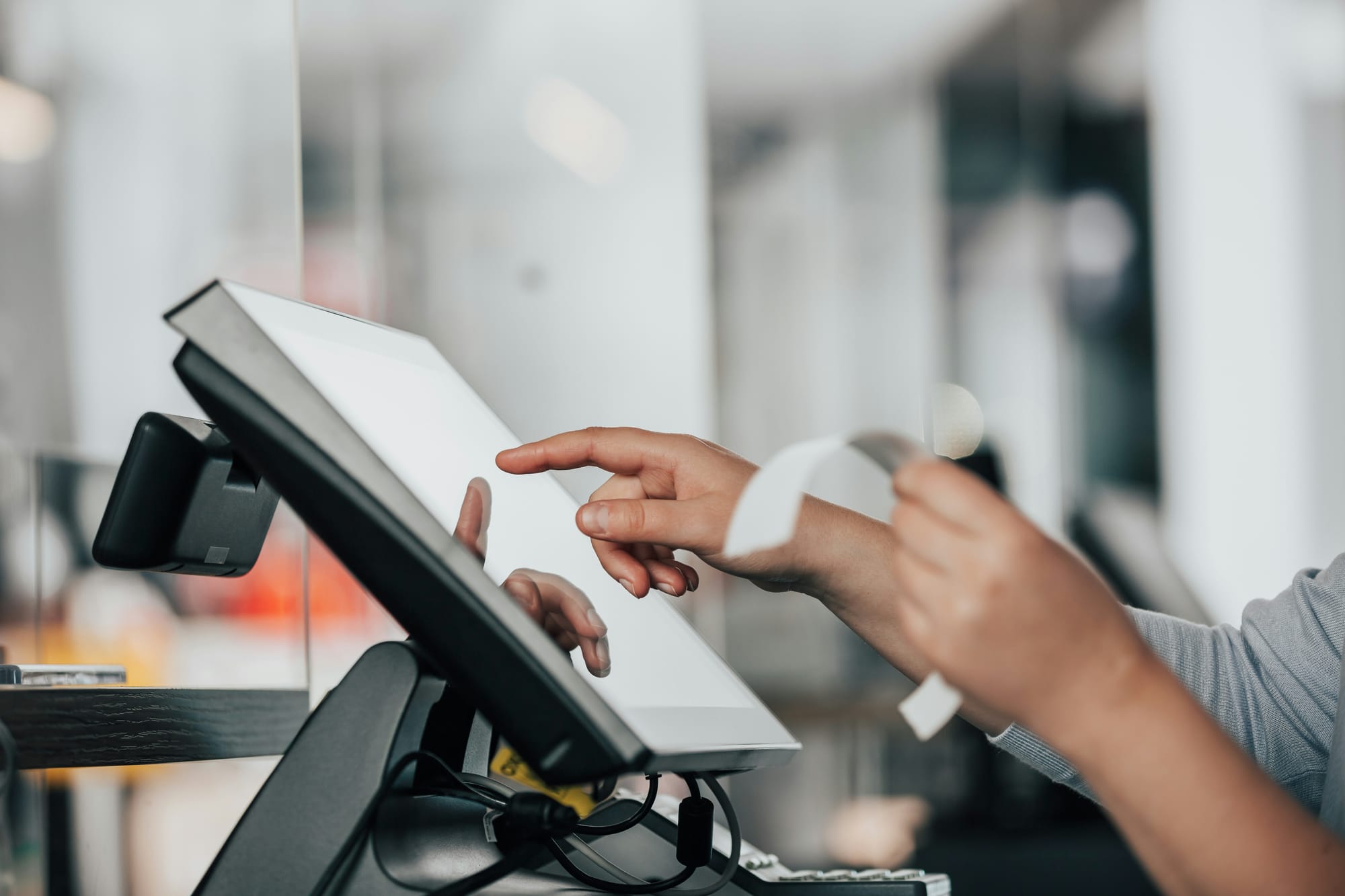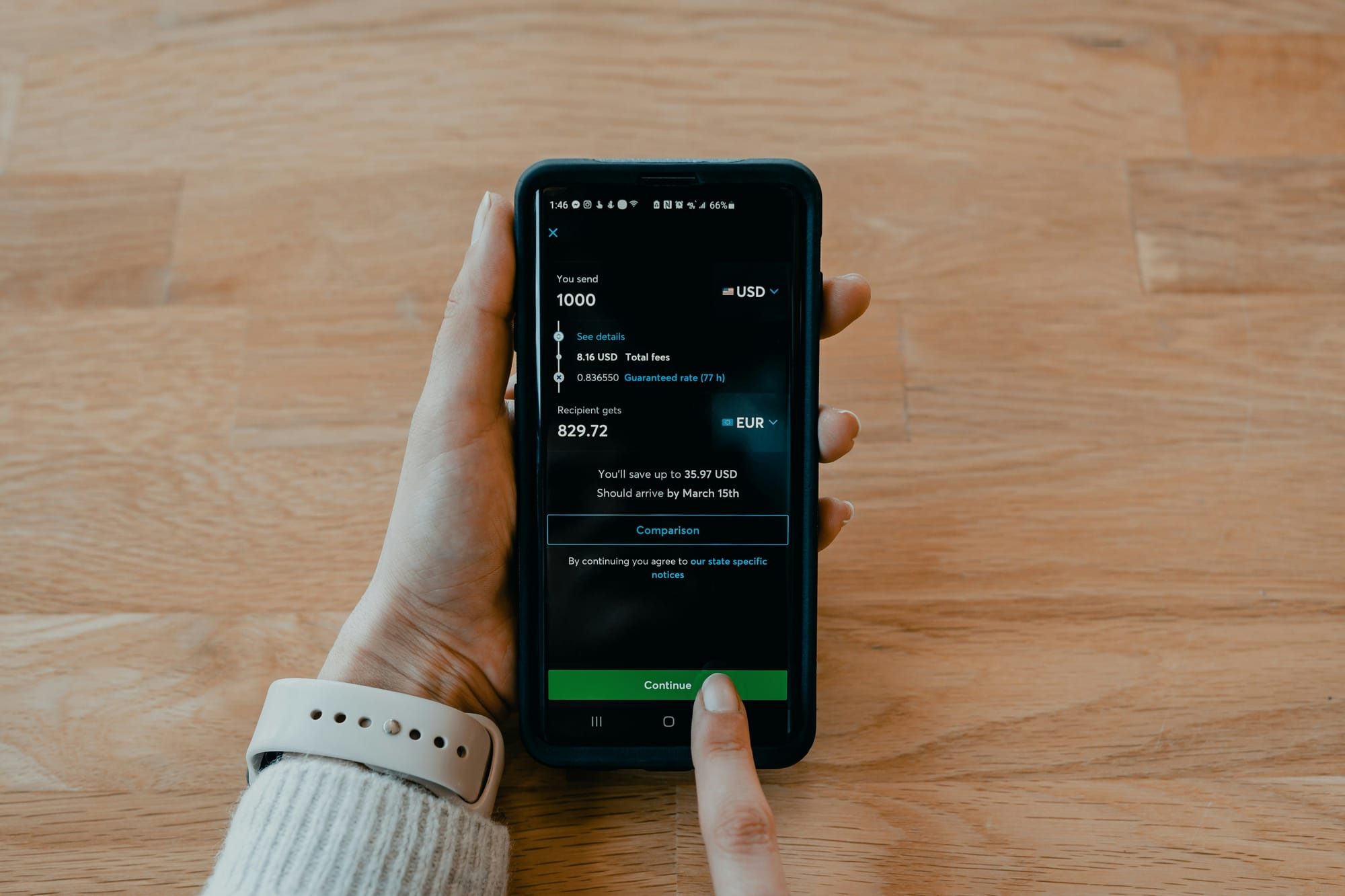
What to look for in POS systems for UK small business: cost
Gabi James
- 7th Jun, 2023
Here we explore how UK small businesses can find the most cost-effective POS system and save a bundle on processing fees.
Welcome back to our series dedicated to helping you find the right POS system for your small business! For an overview of what the series is all about, have a look at our introductory POS blog post. And make sure you catch up on our deep-dive into multi-channel solutions, and the importance of simplicity.
In our earlier POS systems article's, we discussed the importance of providing an easy and quick payment method at the point of sale. Because we all know time is money.
But so is – well, money. And while you don’t need to scrimp on something as pivotal as your Point of Sale system, you also don’t want to spend unnecessarily.
So this blog post is all about finding the most cost-effective POS system without cutting corners, sacrificing functionality, or putting sensitive information at risk.
POS systems are critical for UK small business
Despite the transaction fee and other costs, POS systems in the UK play a major role in business scalability.
We’ll take a closer look at the pivotal role that they play.
Transaction turn-around time:
By reducing the time spent at POS terminals, these systems contribute to the overall shopping experience. Online POS systems support multiple payment methods, facilitate accurate processing, and thereby increase sales opportunities.
Acting as a sales tracker:
Advanced retail POS systems for restaurants and retail stores provide valuable insights into sales figures. The analytics help you assess product movement trends and peak sales hours.
You can tailor your pricing strategy and customise offers based on tangible data.
Customer relationship management (CRM):
The best POS systems in the UK act as proficient CRM tools. Customised analytics help you build personalised promotional campaigns and loyalty programmes. By creating targeted offers, you can foster long-term relationships with your customers.
Inventory optimisation:
Bottling up working capital in slow-moving inventory? With real-time insights from your mobile POS, you can avoid overstocking and stockouts.
Customers will only return with their favourite products. The automated reordering feature ensures that you always have a sufficient supply of top-performing products.
Team management:
POS systems in the UK come with a host of features that can assist in employee tracking. Productivity reports, sales tracking of individual employees, time tracking, and simplified scheduling ensure effective workforce management.
You will be better equipped to control manpower costs and enhance their productivity.
Omni-channel integration:
The best POS systems in the UK allow you to integrate with eCommerce platforms. This provides a seamless experience for customers across multiple touchpoints, leading to a stronger connection with your business.
Augmented security:
A breach of sensitive private data can have long-term implications for your customer relations. Even the cheapest POS systems for small businesses in the UK ensure that adequate measures are taken to safeguard customer information. Your business information is also stored in a secure environment.
Why are Point of Sale systems so expensive?
Unfortunately, the POS systems that dominate are unnecessarily expensive. Card transactions and digital wallets bring significant processing fees that mean a percentage of every sale is taken by a third party.
On top of that, you’re likely paying a per-transaction fee, and very often a subscription to your POS system provider. Plus, you have to shell out for the hardware needed to process these transactions!
What are the hidden costs of traditional POS systems?
Let’s take a closer look at the cost implications of POS in the UK.
Set-up costs:
Even some of the best POS systems in the UK can charge you for installation, configuration, and initial training. You should always get a clear cost breakdown before committing to a POS system for small businesses.
Hardware costs:
While these may not be hidden, small enterprises tend to overlook them. You must factor in expenditures in a traditional POS system, such as tablets, barcode scanners, terminals, receipt printers, and cash.
Aren’t these included in a bundle offer, you may ask?
Yes, some service providers include the required hardware as part of the initial package; others may ask you to purchase it separately. This often leads to a higher initial investment.
You also need to be mindful of evolving technology. Hardware and software that perform perfectly today will have to be upgraded in due course. You must factor these into your budget while opting for a POS system.
Recurring maintenance overhead:
Traditional POS systems are prone to hardware and software breakdowns. This means you have to invest in the regular upkeep of the system.
Many providers have a separate fee structure for technical support, which can vary from monthly subscriptions to per-incident charges.
For small businesses heavily dependent on POS systems in the UK, the maintenance cost can hit the bottom line.
How much do card-based POS systems cost?
Let’s take a look at some of the most popular Point of Sale systems to illustrate the associated processing fees.
Square POS
Square offers a popular and robust POS system. The processing rate for transactions varies according to the payment method:
- 1.75% of each Chip and PIN or contactless payment for every major debit and credit card, Apple Pay and Google Pay
- This raises to 2.5% for Virtual Terminal and Invoices
- Online transactions have not just a percentage deducted, but a flat fee on top of that: 1.4% + 25p for online transactions with UK cards, and 2.5% + 25p for online transactions with non-UK cards
(As published at 24/05/24)
Stripe
Another widely used provider is Stripe. Their fees are:
- 1.5% + 20p for standard UK cards
- 1.9% + 20p for premium UK cards (including all business and corporate cards)
- 2.5% + 20p for EU cards
- 3.25% + 20p for international cards outside of the EU
If currency conversion is required, there’s an additional 2% fee on top of the above.
(As published at 24/05/24)
Shopify
With Shopify, you’ll have a monthly subscription fee of at least £19, plus these per transaction fees:
- 2% + £0.25 online
- 1.7% in person
(As published at 24/05/24)
Best POS for small business: Mammoth savings
All of these fees and percentage deductions can add up fast. Especially if you have high-volume transactions, or are selling frequently and using a POS system that adds a flat fee on top of its percentage deduction.
But thankfully, there is another way.
If you add instant Open Banking transactions to your current payment platforms, you can save a bundle.
Let's look at Wonderful’s pricing model: we don't calculate our fee based on the value of each transaction.
In fact, with our intuitive One app, you pay £9.99 per month for 1,000 transactions - (that's just 1p per transaction).
Introducing One: Instant bank payments, in your pocket
One is a simple and intuitive mobile app that allows businesses to slash transaction fees, bill for any product or service, and request instant payments via QR codes or secure links. 1,000 transactions, for just £9.99 per month (1p per transaction).
That’s right: for just £9.99 each month, you can take 1,000 payments! Compared with the ever-growing mountain of per-transaction fees and deductions, that means enormous savings for almost every business or service provider, whether you’re selling hand-knitted scarves, teaching ESL one-on-one, or selling thousands of pastries each day.
How can we offer such a generous model? Because we don’t need to factor in the huge expense of processing card payments. We cut out the middle man, so customers move money directly from their bank account to yours. And remember, we offer a seven day, no quibble, money back guarantee. See why Open Banking is at the forefront of POS technology!
What are the different subscription models for POS systems in the UK?
We looked at the potential upfront costs of a POS system. The real game is to dive deeper into the overall value proposition of various subscription plans.
How can you navigate this tricky challenge? Let’s dive in:
Annual vs. monthly subscriptions:
Most POS systems in the UK provide monthly and annual subscription plans. The current working capital requirements, scalability, long-term budget, etc. will determine the ideal model for your business.
Typically, monthly plans provide more flexibility, while annual subscriptions come with attractive discount offers.
Assess your business’s stability and growth projections before deciding on a plan that fits with your business goals.
Tiered offers:
Subscription plans come with clubbed bundled features broken into multiple tiers. The basic plan usually processes transactions and shares sales reports. Higher-tier plans may additionally cover customer relationship management (CRM) features, inventory management, and employee tracking.
Select the package that you will be effectively using in your small business. For instance, if you have a small team, do you need a detailed employee tracking function? Well, perhaps not. Opt out of features that don’t add value and try for a custom plan that meets your business needs.
Beyond transactional features:
Some POS for retail shops come with exciting features like loyalty programs, marketing platforms, and eCommerce integration.
While these can be useful for your small business in the long run, analyse their immediate utility.
Do you have enough active customers to run a loyalty program? If yes, then explore these added benefits that can be bundled with the initial offer.
Advanced features in modern POS systems
The evolving spectrum of modern POS has gone beyond mere transactional functions. Tech-driven advanced features help businesses streamline operations and gain data-centric actionable insights that enhance the overall customer experience.
Let’s look at some of the technological breakthroughs that are revolutionising the POS system for small businesses in the UK.
The AI and ML wave
You can now leverage artificial intelligence and machine learning tools to get deeper insights and predictive analytics. With a more profound business intuition, organisations can make data-driven decisions and augment operational efficiency. AI and ML can help in the following ways:
● Sales forecasting
○ Examines past sales data to forecast potential patterns.
○ Assists companies in reducing stockouts and optimising inventory levels.
○ Improves demand analysis and resource allocation.
● Automated CRM
○ Engaging chatbots and virtual assistants to respond to customer queries in real-time.
○ Releases employees from repetitive tasks and allows them to focus on more critical functions.
● Customised consumer connect initiatives
○ You can suggest products based on browsing history and previous purchases.
○ Improves consumer engagement and loyalty through targeted promotions.
○ Enhances customer satisfaction by providing pertinent recommendations.
Cloud-based POS systems
Cloud-based POS software is often the best POS for small businesses. Since data is stored on remote servers, you can access it on the go with a stable internet connection. This makes it operationally viable and provides an additional layer of security.
● Enhanced data security
○ Prevents data loss resulting from malfunctioning hardware by automatically backing up data.
○ Safeguards confidential data with advanced encryption and security measures.
○ Lowers the probability of data breaches by making use of protected cloud infrastructure.
● Real-time data access
○ Allows businesses to access sales and inventory data from anywhere.
○ Supports multi-location management, which makes it easier to manage multiple stores.
○ Enables remote work and mobile company operations.
● Scalability
○ Cloud-based solutions are fast becoming a popular point-of-sale system for small businesses looking to scale up rapidly as they allow additional users and extra features.
○ You can avoid expensive POS hardware.
○ These systems can be integrated with several plugins for optimised performance.
Emerging trends in POS for small business: Contactless payments
Consumer behaviour is an ever-changing realm that keeps business owners on their toes to constantly stay abreast of the latest technological revolutions. Contactless payment is one such solution. They have become the preferred payment option because of their speed and convenience. POS systems now widely accept these payment methods, appealing to consumer preferences for speedy and safe transactions.
Near field communication
● Customers can make payments by tapping their mobile devices or cards using NFC technology.
● Minimises physical contact and expedites the checkout process.
● Accepts payments via Apple Pay, Google Pay, and other mobile wallets. It also processes credit and debit card payments through pre-enabled cards.
QR code payments
● Customers can simply scan QR codes to initiate a transaction via mobile wallets.
● A secure payment mode that not only encourages touchless transactions but also facilitates browsing catalogues, menus, travel packages, etc.
● Can be effectively used for marketing promotions.
Improved security
● Reduces chances of unauthorised access and resultant fraud.
● Leverages tokenisation and encryption technologies to protect customer and business information.
● Build customer loyalty by providing a safe and fast payment interface.
We have gone in-depth to understand the nuances of POS software. Now, let us turn our focus to the hardware part.
POS hardware essentials
Card readers, receipt printers, cash drawers, and barcode scanners are essential for retail outlets to run their businesses smoothly. Card readers should accept chip, swipe, and contactless payments. Customers receive proof of purchase from receipt printers, while cash drawers safeguard transactions. Barcode scanners play a vital role in scanning product information swiftly, decreasing errors, and improving checkout efficiency.
Maintenance secrets
As business owners, the last thing you want is service disruptions due to POS hardware malfunctions. To avoid this, regular upkeep is critical. This includes cleaning equipment, updating software, and checking components for proper operation. You should also invest in credible hardware to ensure longevity and after-sales service. Software updates maintain security and the latest features, while quick troubleshooting prevents minor issues from growing.
Regulatory mandates for retail POS systems
PCI compliance
PCI compliance refers to a collection of security standards that aim to safeguard card information throughout and following a financial transaction. It is essential to ensure that your point-of-sale (POS) system adheres to Payment Card Industry (PCI) standards to prevent data breaches and safeguard client information. To be compliant, you have to use safe POS hardware, encrypt data, and check the system for loopholes regularly. Also, companies need to educate their workers about PCI standards and make sure they follow best practices when dealing with payment information.
Fraud mitigation measures
EVM (Europay, MasterCard, and Visa) chip technology is widely used by the best POS for small businesses as a fraud prevention initiative. This provides a more robust mechanism compared to conventional magnetic stripe cards. Along with tokenisation and encryption, EVM builds consumer trust by protecting their private data from cybercrime.
Embrace the future of Point of Sale systems
To future-proof your business, provide Open Banking instant bank payments at the point of sale.
Not only will you get the newest, safest and most cost-effective payments technology, but you’ll enjoy a whole host of benefits like:
- Increased satisfaction for staff and customers
- A streamlined checkout process
- Boosting sales
- Instant payments
- Heightened security
- Inherent CSR
Plus, our friendly team is on-hand to support you through the simple onboarding and integration process, so that you can have instant bank payments sitting alongside your existing methods in no time. Get started today!
And come back tomorrow to learn more about POS systems and how you can move from weekly or monthly deposits to instant payments.
Conclusion
Investing in one of the best POS systems in the UK can do wonders for your business. However, you must match the services with the package cost before finalising the deal.
Wonderful’s One app leverages advanced features of the Open Banking system to provide cost-effective solutions for small businesses in the UK.
FAQs
What happens if there’s a disruption in the internet connection?
Modern POS systems allow offline transactions. The data is stored locally and updated on the cloud platform when the internet connection is restored.
Can POS systems help me with compliance?
Many online POS systems in the UK assist in generating compliance reports based on sales data and tax calculations. This helps enterprises stay ahead of regulatory norms by submitting taxes on time.
Can I manage my mobile business with POS systems?
Mobile POS systems cater to the growing business of pop-up shops, food trucks, and market vendors to process transactions on the go. By connecting cloud-based software with their smartphones or tablets, these businesses can access all the features of an advanced POS system.
Is there a POS system with no monthly fee?
There are POS systems on the market that don't have any monthly fees. However, keep in mind that these systems might require you to pay more upfront or have higher transaction fees. Before you make a decision, it's crucial to compare the overall cost of ownership, which includes hardware, software, and any hidden charges. If there’s a free trial, then take that option to test their features and service capacity.
Can POS for small businesses integrate with e-commerce platforms?
Many modern point-of-sale (POS) systems now offer integration with e-commerce platforms. With this feature, you can easily manage both online and offline sales. Further, you can optimise inventory levels, sync customer data, and streamline operations.
What is the best POS system for a small business in the UK?
The top POS systems offer a suite of benefits, such as multiple payment methods, a strong security system, detailed inventory management, robust analytics, and cost-effectiveness. Service providers like Wonderful, Square, Shopify POS, and Clover are some of the best in the business.






